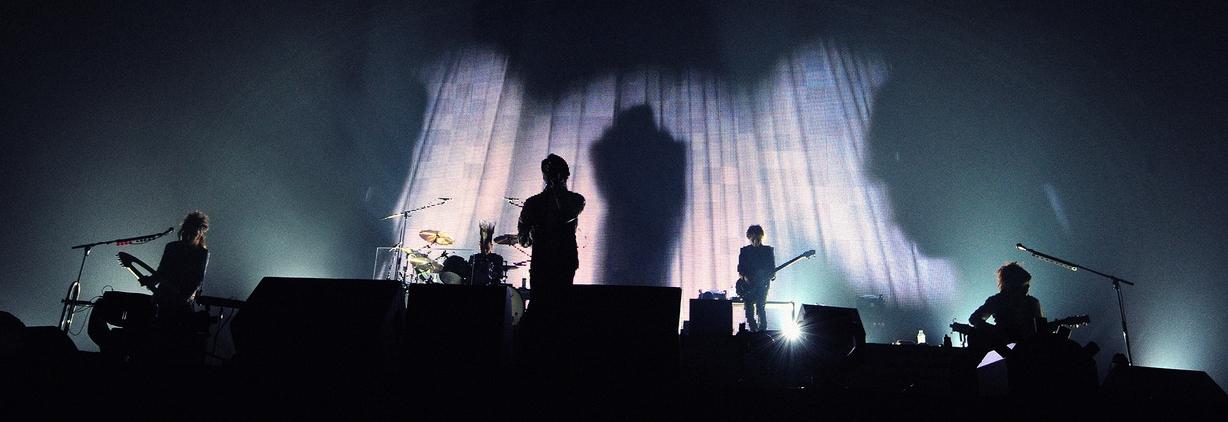Here is more or less the 1st half of the 1st interview. Gonna do the 2nd half tomorrow, or later tonight.
Sorry if some of the stuff seems a bit nonsensical, it was like that to begin with. XD
2004.12.12
Calmando Qual
Source: VisualZero.de
Calmando Qual interview
VisualZero: What was the core concept for starting the band?
Kenka: Immortality!
Tak: I think it was the idea of coming up with something that cannot be categorized (speaking of music, first and foremost), and that the concept of Qual is incorporated into all of this.
Hibiki: I had no other desire but to form a band. I really think I was born for this. Calmando Qual is like a flag of rebellion and it gives meaning among more trivial sentiments and ideas.
Tasc: Despite only having joined the band a year ago, I really like the overall musical feel. It drew me into its world because the messages and meanings of the songs are very expressive. I think Calmando Qual became a better band since I joined.
How would you describe the sound of Calmando Qual to those who haven’t heard your music yet?
Maya: Dark rock. Our melodies do not only express violence, but external anger, internal pain, conflict, insanity and such. One part retrospective bipolarity and one part significant heaviness.
Tasc: Heavy music, ballad of a strong melody, psychedelic style and so on. I, myself, chose a sound that is maybe a bit unconventional for a band, like analogue synthesizers. It seems to be quite an interesting mixture.
Hibiki: I have a feeling most people will think it’s "something else." This is a band that can only be calmed down by music.
Kenka: It affects your soul. It’s a sound that stimulates something deep inside your heart.
Tak: Since the perception of the audience is different, I don’t like to go into explanations much. But simply put, at its core it’s very dark. For clarity’s sake I’d refer to the well-known concept of "gothic."
Going back to your interview with FRUKTO, they translated your band name as "Calm Pain." Since it’s a part of everyday life, do your lyrics reflect this kind of "quiet suffering"? How does this show?
Hibiki: Through our live performance and the way I sing.
Calmando Qual has been around for 3 years now. Looking back, is there anything you would do differently? Are your proud of what you’ve accomplished so far?
Maya: Although I only joined less than a year ago, I find the concerts very uplifting, devoid of any flamboyance, just like we were playing on a rooftop.
Tasc: Before and after I joined the band I got to know many different kinds of guitars, bass playing and singing styles. Even if the movement of the fingers differs from style to style, it all trains one’s sense of rhythm. Looking at that aspect, the past doesn’t seem bad at all.
Tak: There’s a certain kind of responsibility and trust we built up among each other, though it would be a bit pompous to call it pride. It’s all intellectual fodder.
Hibiki: I haven’t thought about the past in this way yet. Am I proud? We haven’t really achieved much yet. We’re just at the stage where each member must think hard about their place in the band.
If we look at your live video of ANTI FLAG on sound-tv.net, it seems the audience is very much engaged in following the words of the storyteller, and is otherwise taken up by the whole spectacle. Is this okay with you?
Hibiki: I am never satisfied! I always hunger for contentment.
A lot of people might falsely interpret the gestures and meanings seen in the video. Could you describe the themes of the song, particularly why you decided to use the German "Heil"?
Hibiki: First I’d like to clear up that I am in no way sympathizing with Nazis and otherwise have no intentions of becoming somewhat of a god. If anyone should have felt offended or repulsed by the words, I apologize. I am sorry. Of course the word "Heil" isn’t part of everyday Japanese speech. Nobody thinks that this word is unusual, same as I. I use this kind of language in a meaning of "being one with everyone" and "glory to us all."
It seems Facid is responsible for some activities concerning the band. What’s your relationship with her? (note: VisualZero keeps contact with the band through Facid)
Hibiki: I got to know her via a friend. After I checked out her work I felt a strong connection. Her work can be labeled as art, indeed!
Tasc: She’s the genius behind every image and photo!
Kenka: She’s the photographer who understands best what the band is about currently. She’s an artist who we fully trust. When we work together it feels like we share the same vision.
Maya: Facid is able to express the abstract imagery of Calmando Qual in a concrete way. I’m often surprised by her ideas.
Tak: I think of Facid as an indispensable supporting artist who elevates and broadens our art.
Tasc previously mentioned how the market of Visual Kei is saturated. Do you think there are many fans left? Do you think the scene will become better again?
Tasc: In Japan, the advertising network of Visual Kei Indies is perfect. The musical output of the market has also improved, and the difference between indies and major is gradually diminishing. A good band can grow in publicity even if it’s not so much part of visual kei. In short, there are good bands and bad bands.
Kenka: Currently there’s no healing process in Japan but I think it’s not impossible in the future.
Maya: These things don’t really concern me and I don’t understand them much either. Whether it’s called visual kei or xxxx kei, I just strive for making music the best I can.
Hibiki: I think this sort of remedy process is hard and it needs time. Japan’s taste concerning visual kei and its fashion style has drastically changed compared to the beginning. What’s more, popular music isn’t competent in showing beauty and intelligence and its fans are prone to have prejudices against other types of people, and this is a growing phenomenon. Calmando Qual will never take up this kind of attitude, we don’t have to play things up to our audience for them to love us. I’m just looking for like-minded people who share this sentiment.
Not every fan of Japanese music understands the language itself. Since lyrics are an important aspect to you, what’s your stance on this?
Hibiki: I guess it must be hard to understand all the words. I listen to music from overseas too, and don’t understand everything. We aim to express ourselves with the feeling of our music and our live performances as well…
Maya: Even if lyrics are an important part of Calmando Qual, you can be sure that just by listening to the music our feelings will come through, even if you don’t understand the words.
Tak: I think it’s up to every band member to ask himself whether this contributes to the balance, concerning the message conveyed through the musical atmosphere. To ability to express something with words and the overall message of Calmando Qual is entrusted to our frontman Hibiki.
Tasc: I want the fans to "translate" the songs personally for themselves. There’s a new kind of "charm" to be found in each track.
Kenka: I think the realm of words is the deepest place for Calmando Qual. Calmando Qual is very deep!
Whenever I listen to your songs, especially silent, a certain kind of ringing sound effect comes to mind, the kind that can be found in Japanese horror movies like Dark Water, Ju-On: The Grudge or Suicide Club. Was it your goal to make the listeners not only enjoy the songs but make them feel uncomfortable at the same time?
Tak: Yes, we could say that. The imagery of our band name shifts between "something beautiful" and "something dirty." Or "a sound that brings joy" and "an unpleasant sound." I like the coexistence of opposites.
Kenka: That is what constitutes the world of Calmando Qual.
Hibiki: There is an element of horror in there, for sure. It’s not like I consciously alluding to it but I try to make it seem natural. If you’ve got "Beauty" as well as "Terror" out of it then I’m happy.
Tasc: Whenever I try to create a certain sound, I look for clues in the lyrics. For example, the song Insanity contains expressions like "atama-wareru" ("head splitting open") or a song about Jekyll and Hyde that makes you feel like a scalpel cutting into a skull with the synthesizer sounds.
Maya: In my opinion it’s already a success that the sounds themselves evoke a certain feeling in the listeners. Silent was created with a concept that the sound effects would carry the story throughout the whole CD. You could say it’s expanding our art. Incidentally, I happen to like both Japanese and foreign horror movies.
What does the future hold for Calmando Qual? What can your fans expect?
Maya: Since we’re on the topic of Germany, all I can think of is German metal! I love listening to Helloween, Blind Guardian and Running Wild, among others. I usually take certain elements from songs that I like fairly easily, and I try to incorporate those sounds into the world of Calmando Qual. I’ve also been thinking of releasing a CD or playing a gig in Germany. Calmando Qual is always growing. Please support us! (^-^)/
Kenka: Even if you don’t know much about us, please follow our activities.
Tasc: We’ll be making good music in the future too, so no fan has to look for another band to listen to!
Tak: I will refrain from giving predictions about the future (for they may cause prejudices or confusion among those who don’t know us).
Hibiki: Calmando Qual will live on until I die (laughs). People might forget about us but still, my wish is that you who share our sorrow and anger in your hearts will accompany us as partners. I don’t exactly know how many fans there are in Germany but I will say one thing: you are not alone!
Any last messages for your German fans?
Tasc: Thank you very much.
Kenka: Thank you for these sharp and penetrating questions. I think it was necessary for us to answer these if people really want to understand the essence of Calmando Qual.
Hibiki: The interview was not unpleasant in the least. If there’s a chance to do it again, we’d be more than happy to! Even if the visual kei scene isn’t well understood in Germany, we promise that Calmando Qual will always be ready to cooperate.

